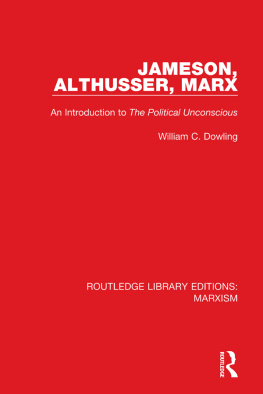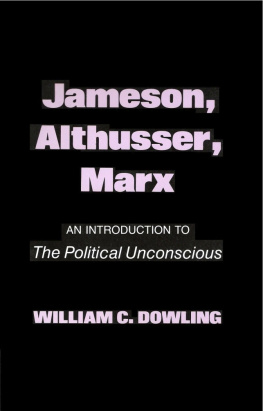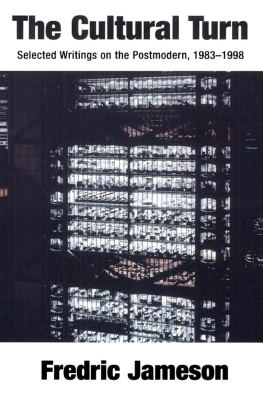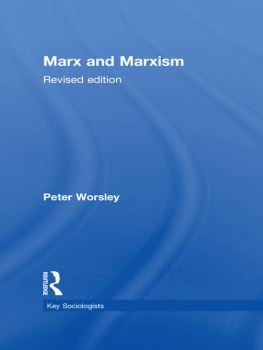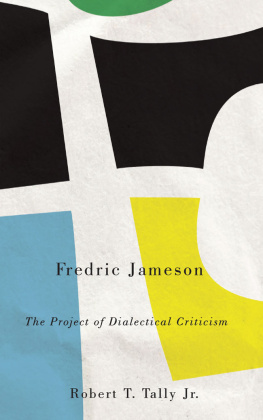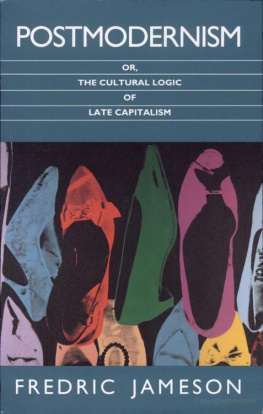ROUTLEDGE LIBRARY EDITIONS: MARXISM
Volume 4
JAMESON, ALTHUSSER, MARX
JAMESON, ALTHUSSER, MARX
An Introduction to the Political Unconscious
WILLIAM C. DOWLING
First published 1984
This edition first in 2015
by Routledge
2 Park Square, Milton Park, Abingdon, Oxon OX14 4RN
and by Routledge
52 Vanderbilt Avenue, New York, NY 10017
Routledge is an imprint of the Taylor & Francis Group, an informa business
1984 William C. Dowling
All rights reserved. No part of this book may be reprinted or reproduced or utilised in any form or by any electronic, mechanical, or other means, now known or hereafter invented, including photocopying and recording, or in any information storage or retrieval system, without permission in writing from the publishers.
Trademark notice: Product or corporate names may be trademarks or registered trademarks, and are used only for identification and explanation without intent to infringe.
British Library Cataloguing in Publication Data
A catalogue record for this book is available from the British Library
ISBN: 978-1-138-85502-1 (Set)
ISBN: 978-1-315-71284-0 (Set) (ebk)
ISBN: 978-1-138-90060-8 (Volume 4) (hbk)
Publishers Note
The publisher has gone to great lengths to ensure the quality of this reprint but points out that some imperfections in the original copies may be apparent.
Disclaimer
The publisher has made every effort to trace copyright holders and would welcome correspondence from those they have been unable to trace.
JAMESON,
ALTHUSSER, MARX
AN INTRODUCTION TO
The Political Unconscious
William C. Dowling
First published in Great Britain
as a University Paperback in 1984 by
Methuen & Co. Ltd
11 New Fetter Lane, London EC4P 4EE
Copyright 1984 by Cornell University Press
Printed in Great Britain by
J. W. Arrowsmith Ltd, Bristol
All rights reserved. No part of this book may be reprinted or reproduced or utilized in any form or by any electronic, mechanical or other means, now known or hereafter invented, including photocopying and recording, or in any information storage or retrieval system, without permission in writing from the publishers.
British Library Cataloguing in Publication Data
Dowling, William C.
Jameson, Althusser, Marx: an introduction to
The political unconscious.(University paperback 871)
1. Jameson, Fredric. Political unconscious
2. Criticism 3. Hermeneutics
4. Narration (Rhetoric) 5. Communism and
literature 6. FictionHistory and criticism
I. Title
801.953 PN81.J29
ISBN 0-416-38410-2
FOR
Lillian, Dorothy, and Frank,
parentibus praeclarissimis
Contents
What follows is, unabashedly, an introduction to Fredric Jamesons The Political Unconscious. It is not a study, not a critique, not a survey of contemporary Marxist criticism or Jamesons place in it, but simply an attempt to make the very demanding argument of one seminally important book available to readers who have heard about its importance but have so far been baffled by it. In recent years, as there has been an explosion in theory and tremendous pressure from the convergence of a number of modern disciplines, such introductions have become necessary and common, but the custom so far has been to reserve them for writers who are either deceased or European (or both). So perhaps I may say a word about why Jameson, as a living American theorist, needs an introduction.
He does not, in one sense, need an introduction at all: among those who follow contemporary theory Jameson has already established himself as the most important Marxist critic now writing, and The Political Unconscious carries his enterprise to a new level. Indeed, the book could claim a seminal importance on either of two separate grounds: as the first sustained attempt to extend into cultural studies in English the Marxist renewal originating in the work of Louis Althusser in France, and as an original and powerful attempt to subsume within an expanded Marxism the rival programs of such thinkers as Jacques Derrida, Michel Foucault, and Gilles Deleuze. We are, as Ive said, in the midst of an explosion in theory, and a number of younger theorists especially show signs of rapid development, but so far Jameson is the only one working in English who writes as the peer of the French poststructuralists. Purely in the toastmasters sense, then, his work needs no introduction.
The Political Unconscious needs an introduction, in short, not because of its undoubted importance but because it is difficult. As anyone can testify who has tried to read the book without help, or who has followed the articles Jameson has been publishing in the interval since his earlier Prison House of Language and Marxism and Form, his thought has in recent years steadily grown knottier and more complex, his manner of presenting it more oblique and compressed. Putting aside for the moment the reasons why Jameson is in no sense guilty of a merely perverse opacity, I may remark at the outset that the difficulty is less than it seems. With the relevant background in contemporary theory and contemporary Marxism filled in, and with Jamesons own central concepts somewhat expanded, his book becomes entirely readable. That is the main reason for providing an introduction like this one.
Still, the mere fact of Jamesons difficulty, or of a writer in English needing an introduction in plainer English, is likely to infuriate the people who remain in high dudgeon about the obscurities of such writers as Derrida and Lacan. Why, to ask the question that always gets asked about such writers, cant he just come out and say what he means? I must confess to a certain sense of weariness when I encounter this question now, one doubtless dating from the time a few years ago when I was trying to master Grammatology and never could manage to explain to various intelligent and genuinely interested friends what this Derrida is saying. What Derrida was saying, I later realized, was that you can come right out and say what you mean only if youve got a false theory of meaning, but even so, he never said that directly, and ... (These are the frustrations one felt.)
The problem raised by Grammatology and The Political Unconscious alike, that is, is the problem of style as enactment: a way of writing that shows as well as tells what it is trying to get across. Thus Derrida cannot just come out and say what he means because the whole ethic of coming out and saying what you mean is based on the referential notion of language whose essential and monumental falsity Derrida is trying to expose. In the sunlit world of Anglo-American empiricism, you and I (our minds, at least) are over here, and the world is over there, and language is the expendable or disposable means of saying what we want to say about it. It has been the business of Derrida and those writing in English under the sign of poststructuralism to suggest that both that world and its attendant style, the plain style enjoined by the Royal Society in the late seventeenth century, may add up to nothing more than a comfortable illusionthat, on the contrary, language may have created the world, and that there is a certain inescapable treachery in the way it did and does so.

